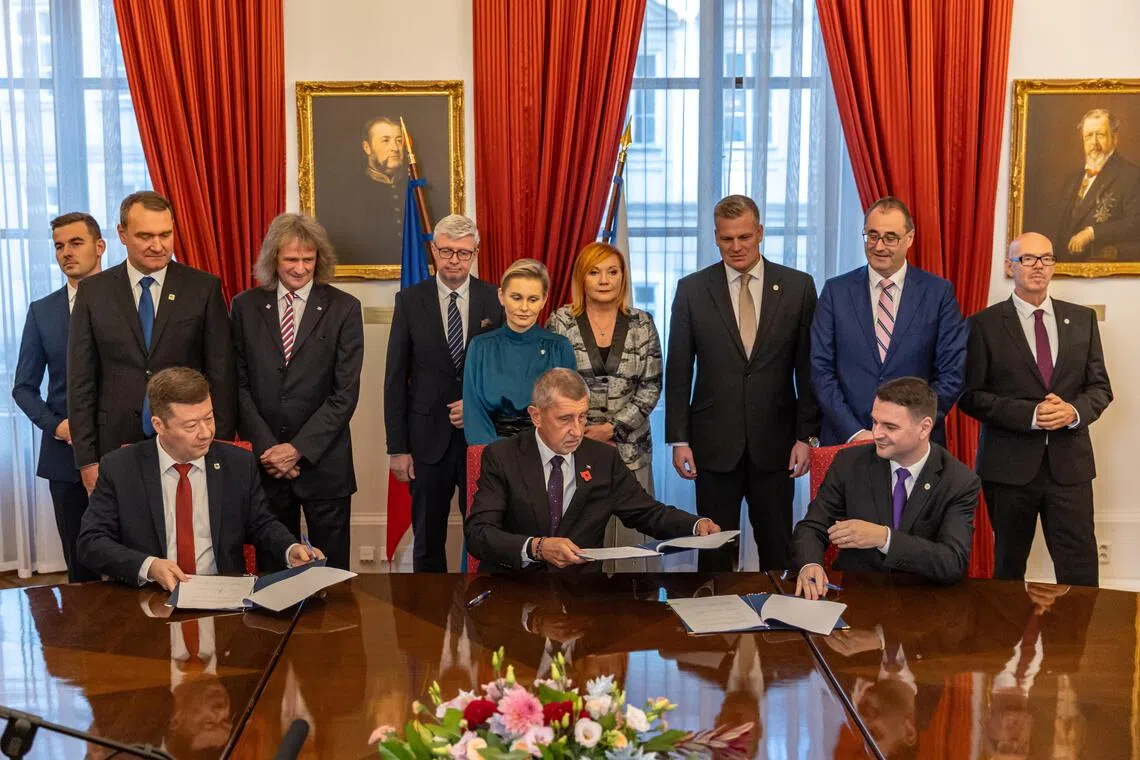Populist Czech vote winner Babis signs coalition deal with Eurosceptic partners
Sign up now: Get ST's newsletters delivered to your inbox

Czech billionaire and ANO party leader Andrej Babis (seated, centre) has teamed up with the Motorists party, which is sceptical about climate change, and the SPD party, which is against the EU and Nato.
PHOTO: EPA
Follow topic:
- Andrej Babis' ANO party formed a coalition with Motorists and SPD, holding 108 seats, aiming to regain power by mid-December.
- The coalition opposes EU climate and migration policies, viewing the Green Deal as "unsustainable" and rejecting the 2035 petrol engine ban.
- Babis pledged to end Czech-led ammunition supplies and Czech budget aid to Ukraine, prioritising national spending and challenging EU policies.
AI generated
PRAGUE - Populist Czech billionaire Andrej Babis’ ANO party signed a coalition deal with fringe right-wing allies on Nov 3, moving closer to regaining power after winning a vote on promises of hiking spending and opposing EU climate and migration policies.
Mr Babis’ return to power with the fringe allies will strengthen the populist, anti-immigration and national sovereignty camp within the European Union that could weaken backing for Ukraine’s defence against Russia’s invasion.
Mr Babis, 71, served as prime minister from 2017-2021. He is joining forces with the Motorists party, which is sceptical about climate change, and the SPD party, which is against the EU and Nato.
He has said he wants to form a government by mid-December.
An ANO-led Cabinet, if appointed, will replace a centre-right government that focused on reducing budget deficits and backing Ukraine.
Mr Babis has pledged to end any aid for Ukraine from the Czech budget. He also pledged before the election a month ago to end a Czech-led and foreign-funded programme supplying ammunition to Kyiv, though he has been more ambivalent after President Petr Pavel urged parties to keep the programme.
The coalition’s draft policy agenda does not commit to any specific spending target, unlike the outgoing government which aimed to lift military spending gradually towards a new Nato target of 3.5 per cent of GDP, plus 1.5 per cent spent on infrastructure improvements.
EU clashes coming
Mr Babis is taking a more combative approach to the EU, promising to reject the bloc’s planned carbon emissions allowance scheme for households, which could set up a legal clash with the EU.
The coalition’s draft agenda says the EU’s Green Deal decarbonisation plan was “unsustainable” and the 2035 target of ending sales of petrol engines “unacceptable”.
Mr Babis reiterated on Nov 3 there would be no questioning of EU and Nato membership, as such.
“Our orientation is clear, but we will not be there just for show... at the European Council, also in Nato, we will be fighting for our interests,” Mr Babis told reporters.
Mr Babis wants an EU run by member states more than the European Commission. During his previous term, the commission ruled that he had a conflict of interest due to his ownership of a large farming and chemicals business empire.
He is an ally of Hungarian Prime Minister Viktor Orban, and a fan of the Visegrad Group which includes Hungary, Slovakia and Poland. The group remains sharply divided on Russia’s aggression against Ukraine, where Poland stands opposed to comparatively pro-Russian Hungary and Slovakia.
Deficits likely to rise
During its term, the outgoing government has cut the budget deficit to 2 per cent of gross domestic product, from 5 per cent.
Analysts have put the costs of Mr Babis’ plans to cut taxes for companies, lift public sector wages, cap the retirement age and subsidise energy prices at billions of euros, with no clear way of financing them.
The three parties have agreed to keep deficits under the EU cap of 3 per cent of GDP. The coalition is also pledging to take no steps towards adoption of the euro, and proposes to enshrine the crown currency in the constitution, although the country has committed to adopt the euro at some point. REUTERS

